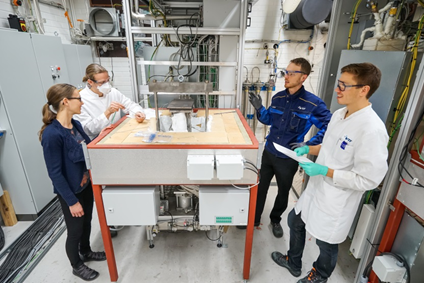
Main competences and lines of research
• VTT has world class knowhow and research facilities to serve fuel cell stack and balance-of-plant component developers as well as system integrators and end-users of hydrogen technology. VTT’s fuel cells and hydrogen experts work with both proton-exchange membrane fuel cells (PEMFC) and solid oxide fuel cell & electrolyser technologies (SOFC & SOEC). PEMFCs are commonly utilized, e.g. as vehicle and back-up power sources, whereas SOFCs are better suited for large-scale stationary installations. Solid oxide electrolysis cells (SOECs) promise an ultimately efficient hydrogen production pathway. Our experts are well networked internationally and e.g. currently coordinating various EU/H2020 projects.
• Proton-exchange membrane fuel cells (PEMFC): Our focus in PEMFC research is both the development on fuel cell system integration and hydrogen quality topics. We have developed PEMFC systems and stacks as well as components for them in co-operation with industrial partners and other research institutes. VTT works also as a consultant for companies purchasing fuel cell systems or electrolysers and can help in validation of these systems. In the last years there has been growing interest for hydrogen fuel cells in maritime sector.
• High temperature solid oxide fuel cells (SOFC): Our laboratories offer testing and characterisation possibilities for SOFC cells, stacks and even complete systems up to several kilowatts. Adaptable, in-house built testing infrastructure allow for tailoring all measurements according to customer needs. A wide range of operation conditions can be realised, such as varying fuel feeds with hydrogen, reformed natural gas or simulated biogas, different impurities in both fuel and oxidant streams or load and thermal cycles. Fully automated 24/7 operation with continuous data logging through a data transfer system with an industrial level of reliability ensure successful long-term durability and performance characterisations. Advanced analysis methods such as electrochemical impedance spectroscopy (EIS), signal spectral analysis and a variety of experiment design methods are commonplace in our laboratories. Simultaneously, professional hydrogen safety measures are second nature to our work. Our team has extensive experience of collaboration with European and international SOFC manufacturers.
• Solving challenges of emission-free hydrogen production and storage: Hydrogen, which is widely used in industrial processes, is also suitable for fuel and energy storage and can be produced from water without emissions. VTT has combined devices that produce hydrogen from water and electricity from hydrogen into a single movable reversible solid oxide cell (rSOC) system, which produces hydrogen in an emission-free manner with excellent efficiency. The movable rSOC device can be installed e.g. in connection with a wind farm, making it possible to store environmentally friendly wind power as hydrogen and convert it back into electricity during peaks in consumption. It can also be easily transported to a vehicle refuelling station or connected to a chemical industry process that uses hydrogen as a raw material. VTT’s rSOC system can also directly utilize other fuels like natural gas or biogas.
Relevant European projects ongoing or concluded
European:
• MARANDA
• HYDRAITE
• qSOFC
• ROREPOWER
• COMSOS
• INNO-SOFC
• BALANCE
• FLAGSHIPS
• e-SHyIPS
• EMPOWER
• ASSENT
• CATION
• HYCORA
• PEMBEYOND
Short description of the research infrastructures used and pictures of them when available
·r-SOFC-SOEC:

·50 kW PEMFC

Many test stations from cell level via BOP components up to whole systems including PEMFC, SOFC and SOEC
